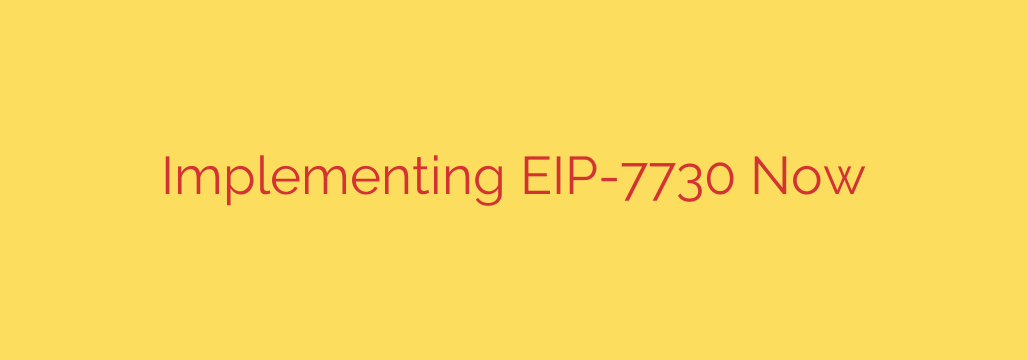
EIP-7730: The Ethereum Upgrade Set to Revolutionize Your Web3 Experience
If you’ve ever felt the frustration of clicking “confirm” on multiple wallet pop-ups just to complete a single DeFi trade or on-chain action, you understand one of web3’s most persistent pain points. This clunky user experience, often called “signature fatigue,” not only slows down interactions but also creates serious security vulnerabilities. A new Ethereum Improvement Proposal, EIP-7730, is poised to solve this problem, paving the way for a smoother, safer, and more intuitive Ethereum ecosystem.
This proposal isn’t just a minor tweak; it’s a fundamental enhancement to how we interact with the blockchain, aiming to bring the seamless experience of web2 applications to the decentralized world.
What is EIP-7730? A Clear Explanation
At its core, EIP-7730 allows you to delegate temporary, specific permissions to a smart contract, enabling it to execute transactions on your behalf. Think of it like giving a valet a key that can only start your car and park it, but can’t open the trunk or drive more than a few hundred feet. You grant limited authority for a specific purpose without handing over full control.
This is achieved by introducing a new opcode called AUTH and a corresponding transaction type. This proposal revives and refines concepts from the earlier EIP-3074, focusing on a secure and practical implementation that could be integrated into the network relatively quickly. It’s a powerful step forward that enhances existing user accounts (Externally Owned Accounts, or EOAs) rather than replacing them.
How EIP-7730 Works: Control and Security at the Forefront
The process is designed to be both powerful for developers and secure for users. It revolves around a few key components that work together to ensure you remain in control.
- The Signature: It all starts with a single, off-chain signature from you. This isn’t a blank check; it’s a highly specific, EIP-712 compliant message that clearly defines the terms of the delegation.
- The “Invoker” Contract: You grant authority to a specific, trusted smart contract known as an “invoker.” This contract is the only entity that can use your delegated authority.
- The
commitHash: This is the cornerstone of EIP-7730’s security model. The signature you provide includes a cryptographic hash of a set of rules—thecommit. These rules dictate exactly what the invoker contract is and is not allowed to do on your behalf. For example, it could be limited to swapping only specific tokens on a certain decentralized exchange. The invoker is cryptographically bound to these rules and cannot deviate from them. - On-Chain Verification: The
AUTHopcode allows the invoker contract to present your signature to the Ethereum network. The network then verifies that the signature is valid and that the invoker’s actions comply with thecommithash you approved.
Crucially, you can revoke this permission at any time by simply sending a standard transaction from your wallet. This increments your account’s “nonce” (a transaction counter), immediately invalidating the old signature and any delegated authority associated with it.
The Tangible Benefits: What EIP-7730 Means for You
The implementation of EIP-7730 will unlock a new wave of user-friendly applications and services. Here are some of the most exciting possibilities:
- Seamless Transaction Batching: Imagine executing a multi-step DeFi strategy—like approving a token, swapping it, and staking the result—with a single signature. EIP-7730 makes this possible, drastically reducing clicks and complexity.
- Session Keys for Web3 Gaming and Social Media: Instead of signing every single on-chain action in a game, you could sign once to authorize a “session.” This would grant the game’s contract permission to perform specific actions (like using an in-game item) for a limited time, creating a fluid and uninterrupted experience.
- Sponsored Transactions: This is a game-changer for user onboarding. Applications can use an invoker contract to pay for a new user’s transaction fees. This removes a major barrier to entry, as users could start interacting with a dApp without first needing to acquire ETH for gas.
- Enhanced Security Through Granular Control: While it may seem like you’re giving up control, EIP-7730 can actually be more secure than the current model. Instead of blindly approving vague transactions, you are signing off on a clear and limited set of permissions. This reduces the risk of falling for phishing attacks where a malicious contract tricks you into signing away all your assets.
Understanding the Risks and Security Considerations
No protocol upgrade is without risks, and it’s important to understand them. The security of this system heavily relies on two factors:
- Invoker Contract Security: The invoker contracts hold significant power. It is essential that these contracts are rigorously audited and developed by reputable teams. A bug in an invoker could lead to a loss of funds for all users who have delegated authority to it.
- Phishing Dangers: Malicious actors will undoubtedly try to trick users into signing EIP-7730 messages that delegate authority to a malicious invoker. This underscores the critical need for wallets to provide clear, human-readable context for every signature request, explicitly stating what permissions are being granted.
Actionable Security Tip: As a user, you must remain vigilant. Always scrutinize the permissions you are granting and the reputation of the contract you are interacting with. Use trusted applications and be wary of any unexpected signature requests.
The Road Ahead: A Leap Towards Mainstream Adoption
EIP-7730 is a pragmatic and powerful proposal that complements other efforts in the account abstraction space, like ERC-4337. While full account abstraction aims to turn user accounts into smart contracts, EIP-7730 provides an immediate and impactful upgrade for the hundreds of millions of existing EOA wallets.
By tackling signature fatigue, enabling gasless transactions, and improving the overall user workflow, EIP-7730 is a critical piece of infrastructure that could finally help bridge the gap between the promise of web3 and the expectations of mainstream users. It’s a vital step toward making Ethereum not just more powerful, but also more accessible and user-friendly for everyone.
Source: https://blog.trailofbits.com/2025/08/27/implement-eip-7730-today/








